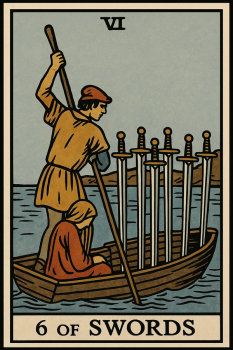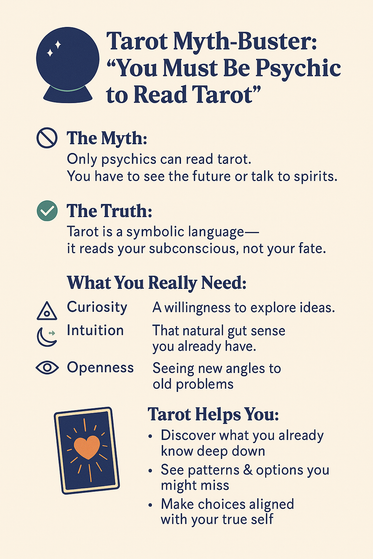
You Must Be Psychic to Read Tarot: Truth or Total Myth?
Do You Need to Be Psychic to Read Tarot?
This is one of the biggest myths that scares people away from picking up a tarot deck. Many imagine tarot readers as mystical oracles who see ghosts in candlelight. But here’s the reality:
You don’t need to be psychic at all to read tarot.
Tarot doesn’t require you to predict the future with supernatural powers. It’s a system of symbols designed to spark insight, helping you look at situations with new eyes. Anyone can learn it — you just need curiosity and a willingness to explore your inner world.
Why People Think Tarot Requires Psychic Abilities
For centuries, tarot has been wrapped in a cloak of mystery. Historical fortune tellers, carnival seers, and secret societies all added to its allure. That doesn’t mean tarot was ever only for psychics.
Part of this confusion comes from the fact that tarot does tap into your intuition, which is sometimes mistaken for psychic power. But intuition is a natural human sense, like memory or creativity.
How Tarot Really Works
Tarot cards are like mirrors for your mind. They give visual form to things you’re already sensing or thinking on a deeper level. Here’s what actually happens in a reading:
- Your subconscious surfaces. The images on the cards trigger feelings, memories, and insights.
- You connect the symbols to your situation. Your brain loves stories and patterns — it naturally weaves the cards into a meaningful narrative.
- You gain perspective. Seeing your question from a symbolic angle helps you spot hidden factors or options you hadn’t considered.
No supernatural downloads needed — just a human mind working through its own layers of meaning.
Does Intuition Play a Role?
Absolutely. But intuition is not the same as being psychic. Think of intuition as your gut sense, a quiet knowing that comes from experience, subtle perception, and emotional intelligence.
Tarot sharpens your intuition by giving it a language — images, archetypes, patterns. The more you read, the more you trust that small inner voice.
Famous Readers Say the Same
Modern tarot authors emphasize that you don’t have to be a psychic medium. Rachel Pollack, author of Seventy-Eight Degrees of Wisdom, writes that tarot is ultimately “a way to see what we already know deep inside ourselves.”
Even Aleister Crowley, notorious for his occult approach, saw tarot as a map of spiritual forces — not a crystal ball only for prophets.

So Who Can Learn Tarot?
Anyone. Tarot is for:
- Artists wanting a spark of inspiration.
- Witches building rituals and spellwork.
- Professionals seeking clarity on business or life choices.
- Seekers exploring spirituality, psychology, or shadow work.
- Or simply anyone who loves beautiful cards and personal growth.
Try This: A Simple Exercise to Bust the Myth
Shuffle your deck and pull a single card. Without looking up the meaning, just describe what you see:
- What stands out?
- What emotions come up?
- How might this relate to something in your life?
Congratulations — you’ve just read tarot, no psychic hotline required.
Summary: Tarot is a Language, Not a Superpower
The myth that “you must be psychic to read tarot” only holds people back from an amazing tool for self-discovery. Tarot is about tapping your intuition, telling symbolic stories, and exploring your mind’s depths.
It doesn’t predict your life — it helps you navigate it.
So grab a deck, stay open, and trust that you already have everything you need inside you.
Related Articles
Your First Tarot Deck Must Be a Gift: Fact or Fiction?
Debunking the myth that your first tarot deck must be a gift—why it’s a superstition, what tarot experts say, and how intention and connection truly matter.
The Ultimate Guide to Daily Tarot Pulls
Discover how daily tarot pulls help you build intuition, gain self-awareness, and learn tarot card meanings. Step-by-step guide, journaling tips, and FAQs.
Is Tarot Evil? Dispelling the Myths
Is tarot evil? Learn the truth behind this common question. Explore tarot’s history, symbolism, myths, and why it’s a safe tool for reflection and growth.